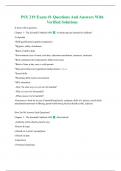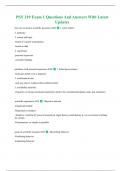Psy 219 - Study guides, Class notes & Summaries
Looking for the best study guides, study notes and summaries about Psy 219? On this page you'll find 29 study documents about Psy 219.
All 29 results
Sort by
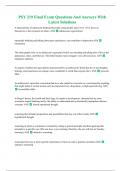
-
PSY 219 Final Exam Questions And Answers With Latest Solutions
- Exam (elaborations) • 18 pages • 2024
-
Available in package deal
-
- $12.99
- + learn more
PSY 219 Final Exam Questions And Answers With Latest Solutions A characteristic of adolescent thinking that leads young people (ages 10 to 13) to focus on themselves to the exclusion of others. ANS adolescence egocentrism repeatedly thinking and talking about past experiences; can contribute to depression ANS rumination The other people who, in an adolescent's egocentric belief, are watching and taking note of his or her appearance, ideas, and behavior. This belief makes many teenage...
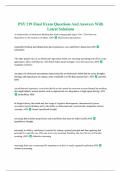
-
PSY 219 Final Exam Questions And Answers With Latest Solutions
- Exam (elaborations) • 18 pages • 2024
-
Available in package deal
-
- $13.99
- + learn more
PSY 219 Final Exam Questions And Answers With Latest Solutions A characteristic of adolescent thinking that leads young people (ages 10 to 13) to focus on themselves to the exclusion of others. ANS adolescence egocentrism repeatedly thinking and talking about past experiences; can contribute to depression ANS rumination The other people who, in an adolescent's egocentric belief, are watching and taking note of his or her appearance, ideas, and behavior. This belief makes many teenage...
PSY 219 Exam #1 Questions And Answers With Verified Solutions
PSY 219 Exam 1 Questions And Answers With Latest Updates
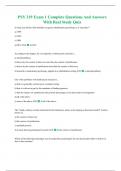
-
PSY 219 Exam 1 Complete Questions And Answers With Real Study Quiz
- Exam (elaborations) • 10 pages • 2024
-
Available in package deal
-
- $12.99
- + learn more
PSY 219 Exam 1 Complete Questions And Answers With Real Study Quiz In what year did the APA formally recognize rehabilitation psychology as a "specialty"? a) 1990 b) 1949 c) 2005 d) 2015 ANS d) 2015 According to the chapter, the vast majority of rehab psych research is... a) interdisciplinary b) driven by the context of discover more than the context of justification c) driven by the context of justification more than the context of discovery d) research in mainstream psychol...
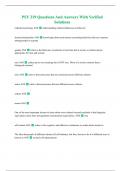
-
PSY 219 Questions And Answers With Verified Solutions
- Exam (elaborations) • 7 pages • 2024
-
Available in package deal
-
- $11.99
- + learn more
PSY 219 Questions And Answers With Verified Solutions cultural psychology ANS understanding cultural influences on behavior shared intentionality ANS knowledge about motivations concerning behaviors that are common among people in a group gender ANS refers to the behaviors or patterns of activities that a society or culture deems appropriate for men and women race ANS culture gives race meaning but is NOT race. More of a social construct than a biological essential
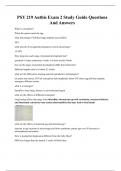
-
PSY 219 Anthis Exam 2 Study Guide Questions And Answers
- Exam (elaborations) • 7 pages • 2024
-
Available in package deal
-
- $11.49
- + learn more
PSY 219 Anthis Exam 2 Study Guide Questions And Answers What is conception? When the sperm meets the egg what percentage of fertilized eggs implant successfully? 50% what percent of recognized pregnancies end in miscarriage? 15-20% How long does each stage of prenatal development last? germinal=14 days embryonic=weeks 3-8 fetal=weeks 9-birth how do the stages of prenatal development differ from trimesters? different lengths each tri is about 12 weeks. what are the differences amoung a...
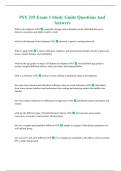
-
PSY 219 Exam 1 Study Guide Questions And Answers
- Exam (elaborations) • 6 pages • 2024
-
Available in package deal
-
- $11.49
- + learn more
PSY 219 Exam 1 Study Guide Questions And Answers What is development ANS systematic changes and continuities in the individual that occur between conception and death, womb to tomb what are the domains of development ANS physical, cognitive, and psychosocial What is aging ANS a range of physical, cognitive, and psychosocial changes. Involves gains and losses, neutral changes, and continuities what are the age grades or stages of lifespan development ANS social defined age group in ...
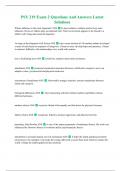
-
PSY 219 Exam 2 Questions And Answers Latest Solutions
- Exam (elaborations) • 6 pages • 2024
-
Available in package deal
-
- $11.49
- + learn more
PSY 219 Exam 2 Questions And Answers Latest Solutions Whose influence is the most important? ANS In most cultures, mothers tend to have more influence. However, fathers play an important role. Their involvement appears to be related to a child's well- being and social development 1st stage of development- Erik Erison ANS trust versus mistrust (0-18 months) infants developed a sense of trust based on response of caregivers. if learn to trust- develop hope and openness. if learn to mistru...
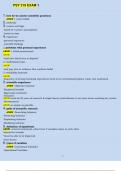
-
PSY 219 EXAM 1 1. how do we answer scientific questions: 1. prior beliefs 2. authority 3. reason and logic -based of 'a priori' assumptions -based on data 4. experience -personal expericne -scientific findings
- Exam (elaborations) • 36 pages • 2024
-
- $10.49
- + learn more
PSY 219 EXAM 1 1. how do we answer scientific questions: 1. prior beliefs 2. authority 3. reason and logic -based of 'a priori' assumptions -based on data 4. experience -personal expericne -scientific findings

$6.50 for your textbook summary multiplied by 100 fellow students... Do the math: that's a lot of money! Don't be a thief of your own wallet and start uploading yours now. Discover all about earning on Stuvia

